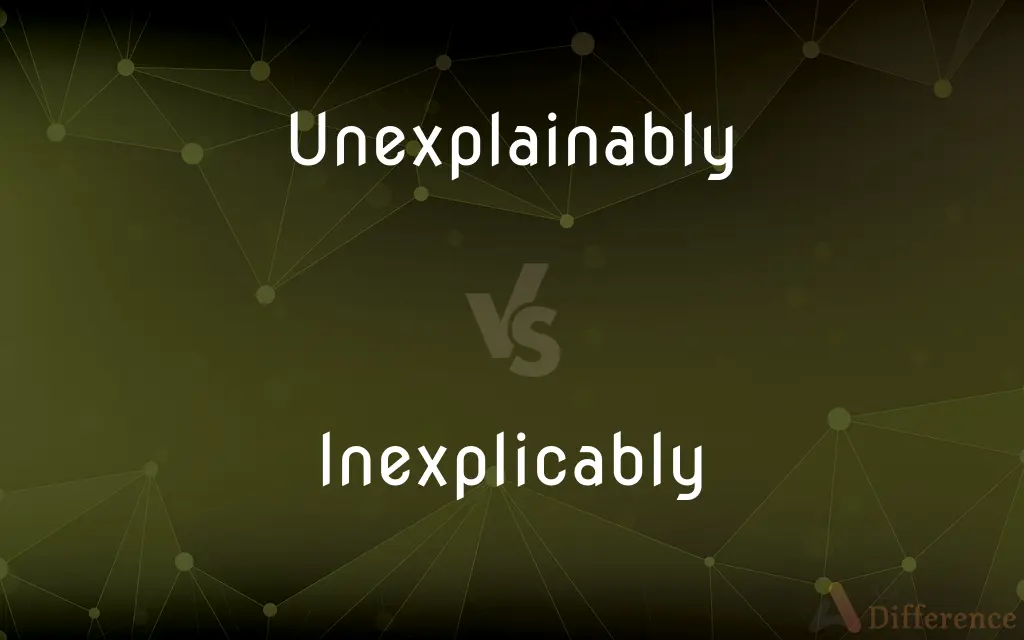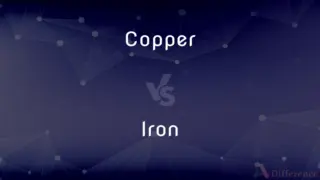Unexplainably vs. Inexplicably — What's the Difference?
Edited by Tayyaba Rehman — By Fiza Rafique — Updated on April 24, 2024
"Unexplainably" and "inexplicably" both convey something that cannot be explained, but "inexplicably" is more commonly used and slightly more formal.

Difference Between Unexplainably and Inexplicably
Table of Contents
ADVERTISEMENT
Key Differences
Unexplainably refers to a situation or phenomenon that lacks a logical explanation; however, inexplicably is often preferred in formal writing and speech to describe occurrences that defy understanding.
In literature and journalism, "inexplicably" is frequently utilized to add a sense of mystery or profundity to events, whereas "unexplainably" might appear in less formal contexts.
Both adverbs suggest that no reasonable explanation can be provided, but "inexplicably" carries a stronger connotation of bewilderment and is often used in more serious or dramatic narratives.
While "unexplainably" might be used in everyday conversation, "inexplicably" is chosen for its precision and impact in academic, scientific, and literary discussions.
The choice between these words can depend on the tone and style desired; "inexplicably" often sounds more authoritative and definitive, enhancing the intrigue or complexity of the description.
ADVERTISEMENT
Comparison Chart
Definition
Unable to be explained
Unable to be explained
Usage
Less formal, common in everyday language
More formal, preferred in written and professional contexts
Connotation
General lack of explanation
Strong sense of mystery and profundity
Common Contexts
Casual discussions, informal writing
Formal writings, academic texts, media
Impact
Standard impact, straightforward
Stronger impact, adds depth and seriousness
Compare with Definitions
Unexplainably
Without a known or understandable reason.
The lights went out unexplainably during the clear evening.
Inexplicably
Used to describe situations that defy understanding.
The artifact disappeared inexplicably from the locked room.
Unexplainably
Describing phenomena beyond usual explanations.
The sudden change in weather was unexplainably rapid.
Inexplicably
Employed in contexts that require a dramatic effect.
He inexplicably vanished, leaving his belongings behind.
Unexplainably
Lacking a logical or clear explanation.
She felt an unexplainably strong emotion towards the painting.
Inexplicably
Without any logical explanation, often implying mystery.
Inexplicably, the seasoned captain lost his way in familiar waters.
Unexplainably
Marking situations where reasons are not evident.
His mood shifted unexplainably over the course of the day.
Inexplicably
Indicating something baffling or hard to fathom.
She inexplicably ignored all advice and went ahead with the plan.
Unexplainably
Applied when usual logic does not apply.
The machine stopped working unexplainably despite regular maintenance.
Inexplicably
Pertaining to occurrences that cannot be logically explained.
The data showed an inexplicably high error rate.
Unexplainably
In a way or to an extent that cannot be explained.
The body and mind are unexplainably connected.
His salary is unexplainably high.
Inexplicably
Difficult or impossible to explain or account for.
Inexplicably
In an inexplicable manner; for an unknown reason.
Inexplicably
In an inexplicable manner.
Common Curiosities
Can "unexplainably" be used in professional reports?
While it can be used, "inexplicably" might be more suitable due to its stronger connotation and formality.
How does the use of "inexplicably" affect the tone of a narrative?
Using "inexplicably" can add a sense of mystery or seriousness to a narrative.
Which term is better for academic writing?
"Inexplicably" is generally preferred in academic writing for its formality and precision.
Are "unexplainably" and "inexplicably" synonyms?
Yes, they are synonyms but differ slightly in usage and formality.
What are the implications of using "unexplainably" in everyday conversation?
It is perfectly acceptable and understandable, though it might not carry as much weight as "inexplicably."
Is there a difference in the level of bewilderment these words convey?
"Inexplicably" often implies a higher level of bewilderment and profundity compared to "unexplainably."
Which term is more impactful in storytelling?
"Inexplicably" is generally more impactful, especially in genres that lean towards the mysterious or dramatic.
What is a simple way to remember the difference between these two?
Think of "inexplicably" for formal, impactful writing and "unexplainably" for more casual or conversational contexts.
Does the choice between these terms affect readability?
Yes, "inexplicably" may enhance readability and interest in formal or literary texts due to its stronger connotation.
What should one consider when choosing between these terms?
Consider the audience, context, and the desired tone of the communication when choosing between these terms.
Why might an author choose "unexplainably" over "inexplicably"?
An author might choose "unexplainably" for a less formal tone or to vary the language in their writing.
How do these words compare in their usage trends over time?
"Inexplicably" has seen more consistent use in formal and written English, while "unexplainably" might appear more frequently in spoken English.
Can either term be used in scientific contexts?
Both can be used, but "inexplicably" is favored for its formality and the depth it lends to scientific discussions.
How does using "inexplicably" in a scientific paper influence perception?
It can help underline the unexpected or mysterious nature of findings, adding gravity to the discussion.
Can the choice of one over the other change the interpretation of a text?
Yes, choosing "inexplicably" might suggest a deeper, more thoughtful examination, whereas "unexplainably" is more straightforward.
Share Your Discovery

Previous Comparison
Copper vs. Iron
Next Comparison
Pilchard vs. SardineAuthor Spotlight
Written by
Fiza RafiqueFiza Rafique is a skilled content writer at AskDifference.com, where she meticulously refines and enhances written pieces. Drawing from her vast editorial expertise, Fiza ensures clarity, accuracy, and precision in every article. Passionate about language, she continually seeks to elevate the quality of content for readers worldwide.
Edited by
Tayyaba RehmanTayyaba Rehman is a distinguished writer, currently serving as a primary contributor to askdifference.com. As a researcher in semantics and etymology, Tayyaba's passion for the complexity of languages and their distinctions has found a perfect home on the platform. Tayyaba delves into the intricacies of language, distinguishing between commonly confused words and phrases, thereby providing clarity for readers worldwide.
















































